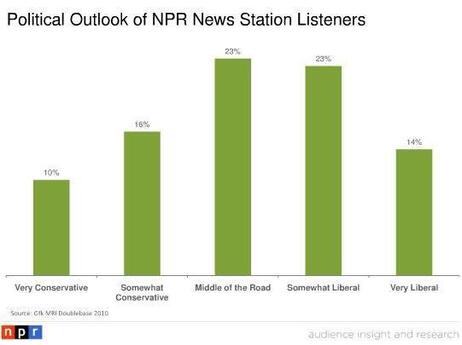Over the last three weeks NPR has released some interesting statistical data about itself through its Ombudsman’s office. The data bolsters common knowledge, that NPR’s politics are moderate-to-liberal. Here is a summary of the revelations.
Listeners
First, the plurality of NPR listeners identify themselves as liberal, but a considerable percentage see themselves as either “conservative” or “somewhat conservative.” Republicans tend to believe less of what they hear on the service than Democrats, however.
 GrK MRI research shows that of its 26.8 million listeners, 23 percent self-identify as ‘middle of the road’. Roughly 37 percent identify as liberal or somewhat liberal, and 26 percent as conservative or somewhat conservative. The believability stats come from the Pew Project for Excellence in Journalism.
GrK MRI research shows that of its 26.8 million listeners, 23 percent self-identify as ‘middle of the road’. Roughly 37 percent identify as liberal or somewhat liberal, and 26 percent as conservative or somewhat conservative. The believability stats come from the Pew Project for Excellence in Journalism.
“NPR and PBS have among the bigger partisan gaps in believability,” says Tom Rosenstiel , the Pew Project’s director. “Thirty seven percent of Democrats say they believe most or all of what they hear on NPR, compared with 29 percent of independents and 16 percent of Republicans. That is a Democrat vs. Republican gap of 21 points, up from two years earlier.”
But:
“That doesn’t establish that NPR is biased. Nor is it unusual to have a partisan gap in believability at most news organizations. But this gap is higher than others by some percentage points. Given that you have members of Congress and others who have long argued that public broadcasting has a bias, this result is not surprising. But it is a distinction that I would think NPR would be concerned about.”
Nervous about corporate sponsorship
Second, about twenty percent of communications from listeners to NPR focus on sponsorship questions.
“What is NPR’s criteria for accepting sponsorships? I live in an area that’s being impacted by natural gas drilling,” one listener called NPR to ask after hearing an acknowledgment for the Natural Gas Alliance. “NPR should be more selective.”
“There’s a general feeling that they want the John D. and Catherine T. MacArthur Foundation, something so neutral, to be the funders,” noted NPR Ombudsman Alicia Shephard recently. “But NPR has grown a lot in corporate sponsorships. When listeners hear sponsors that they dislike, such as Monsanto or America’s Natural Gas Alliance, they call in to say NPR should not accept those funds.”
Think tanks
 Third, the think tank winner is . . . the Brookings Institution! In a survey of think tank people cited on NPR, Brookings wins hands down: 101 mentions or guest appearances from January 1 through October 31, 2010: over twice the runner up, the conservative American Enterprise Institute. Interestingly, the “political ideology” of Brookings rarely gets mentioned, as opposed to AEI (35 appearances or mentions) or the generally liberal/progressive Center for American Progress (29).
Third, the think tank winner is . . . the Brookings Institution! In a survey of think tank people cited on NPR, Brookings wins hands down: 101 mentions or guest appearances from January 1 through October 31, 2010: over twice the runner up, the conservative American Enterprise Institute. Interestingly, the “political ideology” of Brookings rarely gets mentioned, as opposed to AEI (35 appearances or mentions) or the generally liberal/progressive Center for American Progress (29).
The Brookings Institution’s reputation tends to be liberal-centrist, which is why a liberal-centrist radio network like NPR tends to quote its experts so frequently, one presumes. All this points to a news organization that tends to skew moderate/liberal, with an audience very suspicious of corporate influence.


